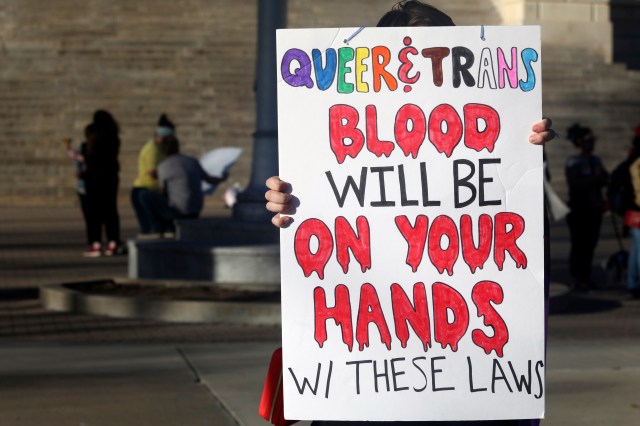
Good morning! We’re Lauren Sausser and Jazmin Orozco Rodriguez, KFF Health News correspondents in Charleston, S.C., and Elko, Nev., respectively. Jazmin covers rural health issues and Lauren covers stories out of the South, except when she’s obsessing about royal family photogate. Send tips about health policy in the South or rural America to [email protected] and [email protected]. Not a subscriber? Sign up here.
Today’s edition: The White House is pressuring health insurers to do more to stabilize the U.S. health industry following a sweeping cyberattack. The federal judiciary adopted a new policy aimed at curtailing “forum shopping.” But first …
Advocates see broad assault on transgender rights from GOP-majority state legislatures
South Carolina’s legislature is poised to pass a bill prohibiting doctors from offering some health-care services to transgender minors — part of a new wave of anti-trans legislation from Republican-led states.
The South Carolina bill, which passed the state House of Representatives in January and is under consideration in the Senate, would bar health-care providers from performing gender-transition surgery, prescribing puberty-blocking drugs and overseeing hormone treatments for patients under 18.
It would also mandate that school officials notify parents of a student’s transgender identity and block the state Medicaid program from paying for gender-affirming care to patients under the age of 26.
Nationwide, high-profile Republicans including Florida Gov. Ron DeSantis have made crackdowns on transgender rights central to their political agendas, which has helped encourage state-level legislation that critics call bigoted. Twenty-three states had passed laws restricting gender-affirming care as of the end of February, according to KFF.
Anya Marino, director of LGBTQI equality at the National Women’s Law Center, a nonprofit that advocates for women’s rights, said apart from the legal concerns some of these bills raise, she also worries about other consequences, including acts of violence against transgender people.
“It’s part of a larger objective to control people through body policing to determine how they love and how they navigate their daily lives,” Marino said.
South Carolina and Virginia are the only two states in the South that haven’t passed laws or policies limiting youth access to gender-affirming care, according to KFF.
Republican-led legislatures in other states are advancing bills to restrict medical care and access to public restrooms for transgender people — so-called “bathroom bills” that have been heavily criticized by Democrats and transgender people.
In January, Utah passed a law modeled after the “Women’s Bill of Rights” created by the conservative nonprofit Independent Women’s Law Center. The bill establishes strictly biological definitions for “male,” “female” and other terms related to sex that don’t include gender identities like nonbinary and trans.
Similar bills are under consideration in Arizona, Georgia, Idaho, Iowa, New Mexico and West Virginia. Last year, leaders in Kansas, Montana, Nebraska and Oklahoma approved versions of the policy through legislation or executive order.
South Carolina Gov. Henry McMaster (R), who signed a 2022 law that bans transgender students from playing girls’ or women’s sports in public schools and colleges, said at a January news conference that he thought the transgender health-care bill was a “good idea.”
If children “want to make those decisions later when they’re adults, then that’s a different story,” McMaster said. “But we must protect our young people from making irreversible errors.”
South Carolina Senate Democratic leader Brad Hutto said the point of the bill is to boost Republican fundraising and predicted it would face immediate legal challenge if it became law. “It’s clearly a far-right agenda item that doesn’t have anything to do with reality or facts,” he said. “It’s just red meat for that segment of the far right.”
KFF Health News is a national newsroom that produces in-depth journalism about health issues and is one of the core operating programs at KFF — an independent source of health policy research, polling, and journalism.
White House prescriptions
White House turns up the heat on UnitedHealth Group as payment paralysis enters 3rd week
Biden administration officials hauled UnitedHealth Group CEO Andrew Witty and other industry leaders to the White House yesterday to demand they make more emergency funding available to providers affected by the cyberattack on Change Healthcare, our colleague Dan Diamond scooped.
Inside the meeting: Health and Human Services Secretary Xavier Becerra and White House domestic policy chief Neera Tanden pushed the insurers to account for the premiums they are collecting from patients but not paying out to health-care organizations, as unpaid medical bills pile up.
Anne Neuberger, White House deputy national security adviser, also helped lead the discussion, where government leaders and industry experts said they remain worried about the sensitive patient data stolen by the hackers. Health-care providers, meanwhile, raised ongoing issues, such as difficulties obtaining emergency funding from Medicaid plans.
The timeline: UnitedHealth said it expects to begin testing and reestablishing its claims network March 18, but health-care leaders said they were bracing for weeks of continued disruption.
Meanwhile …
New this a.m.: The Biden administration is launching the White House Challenge to Save Lives from Overdose in an effort to combat the nation’s increasingly lethal drug supply.
The challenge calls on stakeholders from all sectors to commit to three actions: Train employees on administering opioid overdose reversal drugs, include the medication in first aid kits, and distribute it to customers and staff.
In the courts
Federal judiciary aims to curb ‘judge shopping’
The federal judiciary unveiled a new policy yesterday in an effort to tackle widespread concerns about “judge shopping,” our colleagues Tobi Raji and Ann E. Marimow report.
Under the updated rules from the Judicial Conference of the United States, civil cases that have statewide or national implications will be assigned at random to a judge within the same judicial district.
The bigger picture: The issue of “judge shopping” gained national attention in 2022 after antiabortion activists filed a lawsuit seeking to revoke federal approval of the abortion drug mifepristone in a division with just one judge: Matthew J. Kacsmaryk, known for his long-held antiabortion beliefs.
The Biden administration, Democratic lawmakers and organizations such as the American Bar Association have raised concerns about the practice in the past, and Chief Justice John G. Roberts Jr. also highlighted the issue in his 2021 Year End Report on the Federal Judiciary.
In other news from the courts …
- A federal appeals court upheld an Arkansas law that requires pharmaceutical companies to offer low-cost medicines to contract pharmacies in the 340B federal drug discount program.
- Federally funded family planning clinics in Texas must receive parental permission before prescribing birth control to teenagers, a federal appeals court ruled.
On the Hill
Lankford scuttles vote on IVF
Sen. James Lankford (R-Okla.) blocked passage of a bill yesterday aimed at expanding access to in vitro fertilization and other family-building services for all veterans.
Lankford said the legislation “had not been fully vetted” and rejected Sen. Patty Murray’s unanimous consent request.
Key context: The Washington Democrat pushed to expedite her bill after the Department of Veterans Affairs announced plans to cover IVF services for unmarried veterans and those in same-sex relationships. The legislation would eliminate a policy that requires veterans to prove their fertility challenges were caused by their service to qualify for the benefit.
Sen. Patty Murray (D-Wash.):
Meanwhile, across the Capitol …
The House Energy and Commerce health subcommittee voted to advance 19 bipartisan bills to the full committee, including measures to reduce provider burnout, prevent stillbirths and improve care for Alzheimer’s disease.
From our notebook
The Post’s David Ovalle sends us this dispatch:
When Congress legalized hemp in 2018, it spawned a federally legal market for delta-8 THC, a substance derived from hemp that gets you high like marijuana. Delta-8 is infused into drinks, gummies and vapes that can be bought at gas stations, convenience stores and online.
In a new study, 11 percent of high school seniors reported recent use of delta-8, particularly in states without legalized marijuana, which suggests “appreciable” use of the substance by adolescents nationwide, researchers said. The study by researchers at University of Southern California, UCLA and the University of Michigan underscores delta-8’s popularity — and uncertain health consequences. “Cannabis use in general has been associated with negative impacts on the adolescent brain, so we must pay attention to the kinds of cannabis products teens are using, educate young people about potential risks,” said Nora Volkow, director of the National Institute on Drug Abuse, which funded the study.
For a deeper dive, check out my and Fenit Nirappil’s story on legal and regulatory uncertainty surrounding intoxicating hemp products.
Health reads
Rigid rules at methadone clinics are jeopardizing patients’ path to recovery from opioid addiction (By Lev Facher | Stat)
New York trusted this company to care for the sick and elderly. Instead, it left people confused and alone. (By Jake Pearson | ProPublica)
Lawmakers push for telehealth waiver extension before expiration (By Ganny Belloni | Bloomberg Law)



